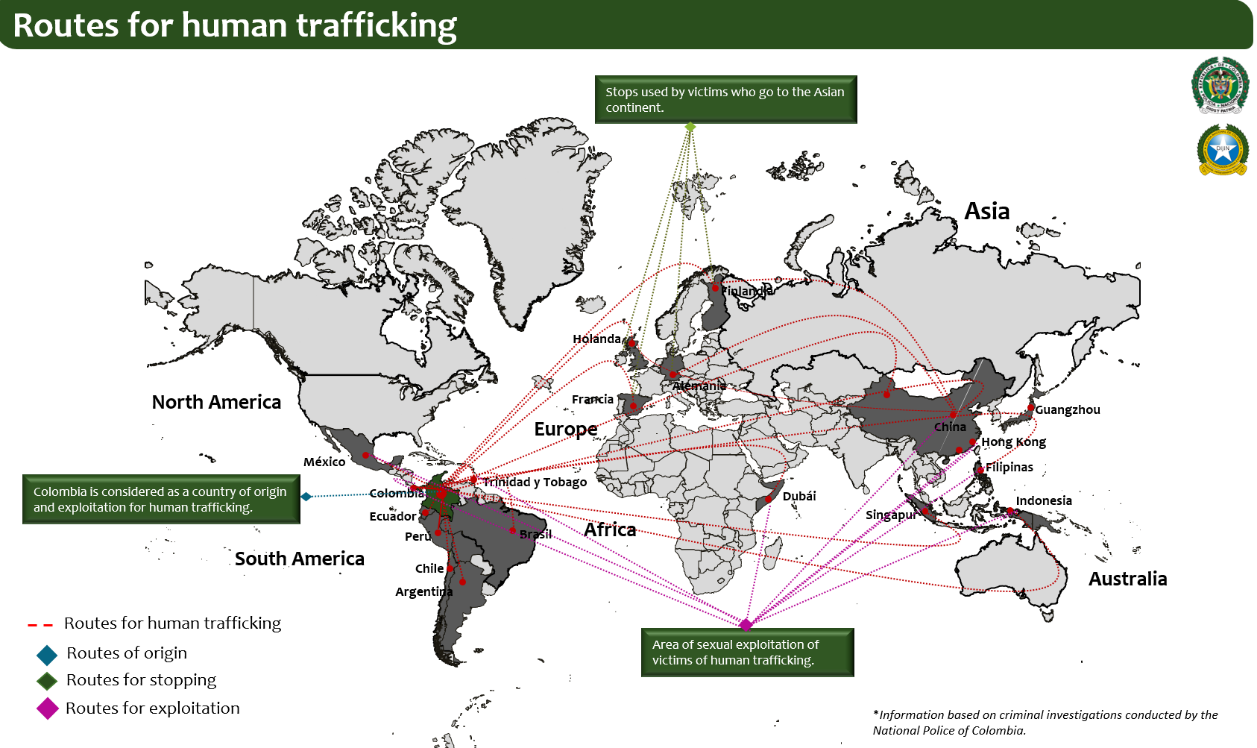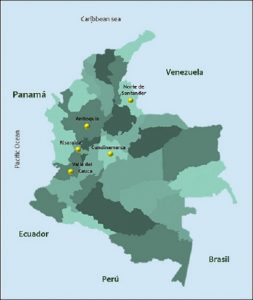Start a criminal justice degree at American Military University. |
By Dr. Jarrod Sadulski, Faculty Member, Criminal Justice, American Military University and
Major Efren Muñoz Criminal Investigation Directorate and INTERPOL, National Police of Colombia
Human trafficking is a major problem around the world and, according to the International Labor Organization, it is a $150 billion a year illegal enterprise.
Recently, the National Police of Colombia, through Major Efren Muñoz, invited AMU’s School of Security and Global Studies Program Director Dr. Chuck Russo and me to visit Bogotá, Colombia, to conduct research into current criminal justice issues in that country. Part of that research trip included a visit to the Criminal Investigation Directorate and INTERPOL, which is focused on stopping human trafficking.
According to the U.S. State Department, Colombia is a Tier 1 country, meaning that it fully complies with the minimum standards for the elimination of trafficking according to the Trafficking Victims Protection Act. The Colombian government has demonstrated sustained efforts to combat human trafficking through its investigation into an increased number of cases and a new national Anti-Trafficking Information System launched in 2019.
Understanding the Human Trafficking Problem in Colombia
Visiting the Criminal Investigation Directorate and INTERPOL (DIJIN) gave us a first-hand opportunity to gain a deeper understanding of the human trafficking problem in Colombia and what is being done to combat it.
While visiting DIJIN, Colombian National Police Captain Sol Leydi and Major Muñoz provided an informative presentation on the human trafficking problem and how it is approached from the perspective of both transnational and domestic trafficking.
[Related: Gang Involvement in Human Trafficking in Central America]
Transnational human trafficking involves forcing victims out of Colombia and exploited in another country. For example, a Colombian victim might be forced into the sex trade or other forms of human trafficking in another country.
Internal trafficking involves the recruitment, transfer, and exploitation of victims within Colombia. The Colombia National Police focuses on several different modalities of human trafficking, including:
- Sexual exploitation
- Homeless exploitation
- Marriage for asylum
- Organ trafficking
- Labor exploitation
Since 2013, a total of 516 women and 109 men have come forward and been identified as victims of human trafficking by the Interior Ministry of Colombia. Victimization typically occurs through kidnapping, blackmail, deception, abuse of power, or promises of economic gain.
[Related: Human Trafficking and the Children of Central America]
Recruitment often occurs through social media where human traffickers make false promises by offering modeling opportunities, for example. Sometimes the victim is forced into the sex trade by marriage or by false promises of employment. Human trafficking exploitation and recruitment also occur in schools, universities, modeling academies, and discotheques. Led by the Colombian National Police, DIJIN has identified trafficker profiles that include the following characteristics:
- Traffickers who remain constantly with the victim
- Control all expenditures
- Collect fines imposed on human trafficking victims
- Monitor and control the victim’s time and money
- Handle visa renewals for victims
- Establishes operating rules for victims
- Manage victims’ trips and documentation when they are taken out of the country or to another department within Colombia
Victims are typically low-income women, women who are the head of the household, have little formal schooling, or a need to make money. These victims are often exploited through false job offers as nannies, waitresses, and saleswomen.
The Highest Number of Colombian Human Trafficking Victims Are Sent to Asia
Interestingly, the Colombia National Police has identified Asia as the region with the highest number of Colombian human trafficking victims. Mexico and other countries in South America are also trafficking destinations. Although the United States is not a major destination, most of the human trafficking cases from Colombia in the U.S. involve employment exploitation.
The map reflects the transnational routes of victims of human trafficking from Colombia.

The first comprehensive federal law to combat human trafficking in the United States was the Victims of Human Trafficking and Violence Protection Act (TVPA) passed in 2000. Colombia introduced its first comprehensive human trafficking law that same year and added other human trafficking laws to further define and prosecute human trafficking in 2002, 2003, and 2005.
Working with International Partners
Colombia’s proactive approach includes anti-human trafficking agreements with 18 countries.
For example, the Bogota government has memoranda of understanding to combat human
trafficking throughout South and Central America, including with Ecuador, Chile, Argentina, Honduras, El Salvador, Costa Rica, and Peru.
The proactive approach also includes assigning investigators in all regional and sectional criminal investigation divisions to address human trafficking, utilizing intercepted communications and analyses groups.
Criminal Analysis Centers study major criminal organizations and analyze their characteristics. Agencies work together in these centers to develop trafficking intelligence while specialized attorneys dedicated solely to human trafficking cases prosecute the offenders. Prison sentences for those convicted typically range from 13 to 23 years. In addition, Colombia is continuously trying to train additional prosecutors and investigators.
An analysis conducted into the areas in Colombia where human trafficking is most prevalent found that Antioquia, Cundinamarca, Norte de Santander, Risaralda, and Valle del Cauca were the most vulnerable departments due to the victims’ circumstances and financial vulnerability.

Our visit to the Criminal Investigation Directorate and INTERPOL was very informative. We learned that significant time and manpower are spent combating human trafficking in Colombia. That the Colombia National Police, a world renowned professional organization, is dedicated to eradicating human trafficking was quite evident.
About the Authors:


To contact the author, email IPSauthor@apus.edu. For more articles featuring insight from industry experts, subscribe to In Public Safety’s bi-monthly newsletter.

Comments are closed.